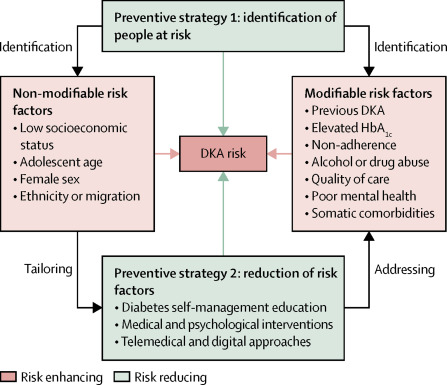How Does DKA Affect Your Blood Sugar?

Diabetic ketoacidosis is an extremely dangerous condition that effects people who have developed diabetes
It occurs when the pancreas begins to break down ketone in a very rapid rate. The pancreas then produces too much insulin to handle all of the glucose in the bloodstream. The result is ketosis, a condition in which the brain sends signals to your body to switch from burning sugar to burning ketone instead.
Ketone are not dangerous to the body because they're produced in small quantities. They cause the stomach to produce more acid to the stomach's ability to digest food is impaired, causing the symptoms that occur during DKA. A ketone can be harmful to your body if it develops in high enough amounts. In some cases, ketosis results in death. This condition is known as diabetic coma, diabetic ketoacidosis, diabetic ketoacids, diabetic ketoalbumosis or ketoacids.
Symptoms of DKA may include loss of consciousness, seizures and coma. The effects of ketosis may occur in a matter of minutes or over a long period of time, but they usually occur slowly. The symptoms of ketoacidosis can occur suddenly occur after weeks of having normal diet and exercise. People suffering from DKA are usually very thirsty, weak and generally not feeling well, even when they eat just carbohydrates. The symptoms also include frequent urination, nausea, dizziness, weakness, loss of muscle control, mental confusion and hallucinations.
If you think you may have developed DKA, seek medical care immediately. Your doctor will perform an assessment on you and determine the appropriate treatment for your condition.
The first step to treating the symptoms of DKA is to get your blood levels under control. Your doctor may recommend you to start a diet that has less sugar in it. Your doctor may also prescribe medication to reduce your blood glucose level. You will probably need to take medicine for one to three weeks before you to start feeling better and it may take up to six months to correct the situation. Your doctor will help you determine the amount of medication you need based on your weight, height, weight gain, blood sugar level and other conditions that may affect your health.
You may be instructed to make changes to your lifestyle so that you can keep track of your blood sugar levels without your doctor's supervision. Changes in your lifestyle include avoiding carbohydrates, increasing exercise and avoiding alcohol. Also, you should increase the amount of fiber in your diet and decrease your amount of protein. This helps to prevent your body from producing too much ketone.
Your doctor may suggest a diabetic diet plan to help you lose weight
This diet will help you avoid food that can trigger DKA. Your doctor may also recommend medications that help control your appetite. These medications are usually taken for a short period of time, usually between two to five days.
A doctor should take some type of test to determine what causes your ketosis symptoms. Tests may include blood tests and special tests, such as the glycemic index.
There are some serious complications that can occur from ketosis, including severe dehydration, kidney failure and coma. It is important to recognize and correct any problems that develop during your treatment.
Seek medical care right away if you develop symptoms that do not respond to standard treatment. If you are already experiencing complications, see your doctor as soon as possible to prevent permanent damage to your kidneys, liver and other organs. Seek medical attention as soon as possible because serious complications may require emergency surgery and other treatment options.
Once your doctor gives you the OK, start with your diet, and stay with it. This plan may take some time, but it is important that you stick to it.
If you find that your blood sugar level stays in the normal range, continue with your plan. Your doctor will help you monitor your progress.